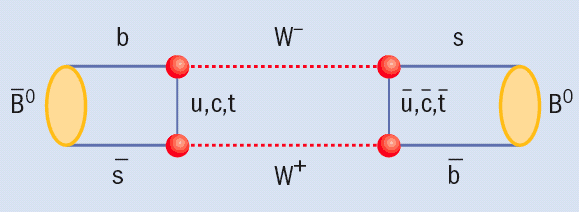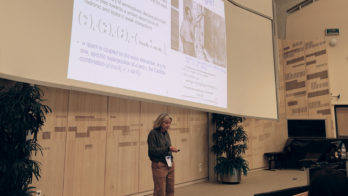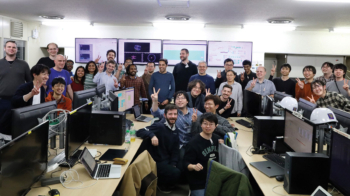The D0 collaboration at Fermilab has published the first direct two-sided bound on the oscillation frequency of the B0s, the meson comprising a strange quark (s) and a bottom antiquark (Bbar). The result is consistent with what is expected from the Standard Model, within a 90% confidence level. The phenomenon in which a B0d meson (with a down quark, d, instead of the strange quark) converts into its antiparticle Bbar0d is well established, and its oscillation frequency Δmd has been measured precisely (Heavy Flavour Averaging Group 2006). The value of the corresponding measure of the oscillation frequency of a B0s meson into its antiparticle Bbar0s – Δms – was until now much more poorly known.

The D0 collaboration is an international team of 700 physicists from 90 institutions and 20 countries working at Fermilab’s Tevatron, which provides high-energy proton-antiproton collisions for two experiments, D0 and CDF. The data for the D0 result were taken from 1 fb-1 of total collision data, yielding more than a billion events (Abazov et al. 2006). The 90% confidence level means that the result does not qualify as a discovery, although it does provide a very strong indication. However, according to Rob Roser, co-spokesperson of CDF, within the next month or so the CDF collaboration should provide a result with greater precision.
The D0 result already provides some interesting constraints on supersymmetry. “The D0 value of 17 < Δms < 21 ps-1 limits the contributions to the oscillation process that could be made by supersymmetric particles,” explains D0 co-spokesperson Terry Wyatt, from the University of Manchester. “The basic idea is that supersymmetric particles may be exchanged in the box diagrams that are responsible for B0s mixing.” Several theoretical models of supersymmetry predict a much faster oscillation of B0s, and the D0 result now disfavours these models.
Further reading
V M Abazov et al. D0 Collaboration 2006 http://arXiv.org/pdf/hep-ex/0603029.
Heavy Flavour Averaging Group 2006 http://arXiv.org/pdf/hep-ex/0603003.





